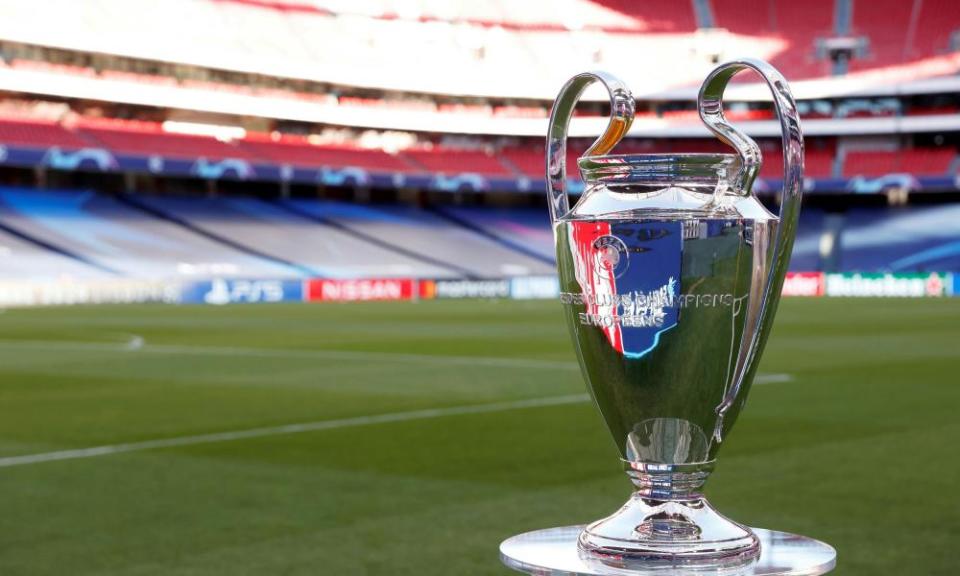Champions League final switch good for environment but football must do more

It was bad enough in 2019 when tens of thousands of football supporters from the United Kingdom traipsed across Europe to watch two English clubs, Tottenham and Liverpool, play the Champions League final at Atlético Madrid’s stadium in Spain. More easily, cheaply and comfortably they could have hopped on a train or coach, or driven to meet each other halfway in Birmingham.
Now, not only are we still in the middle of a pandemic, with Turkey, where this season’s Champions League final between Manchester City and Chelsea was initially scheduled to take place on 29 May, registering an average of 29,000 new coronavirus cases per day, but since 2019 there has been a rising tide of awareness about the climate emergency and the urgent need to reduce carbon emissions.
Related: The climate crisis and football – Football Weekly special
The governing body is infamous for not reading the room on issues ranging from racism to corruption, and has the fossil fuel company Gazprom as a long-standing major sponsor. But this time it failed to read the stadium. Flying to Istanbul under current restrictions was always going to be a joyless, isolated, experience and, most importantly, risk the spread of infection. Four thousand fans flying each from Manchester and London on half-full planes would have put about 6,400 tonnes of CO2 into the atmosphere (assuming everyone flew economy, and not including players, staff, media and entourage). That’s the equivalent of burning the gasoline from 84 tanker trucks. Sport knows all about the importance of marginal gains in athletic performance, but decisions like this make it look, in climate terms, like it’s still stuck on the sofa, drinking, smoking and downing doughnuts.
“Once again Uefa misses an open goal,” said Prof Peter Newell of Sussex University, author of a recent groundbreaking report on sustainable behaviour change and research director at the Rapid Transition Alliance, before the change of venue was announced. “Rather than playing a leading role in modelling sustainable behaviour change, it shows itself to be off the ball firstly, by getting two British teams to play a final in Turkey and thereby generating huge amounts of carbon through unnecessary travel, and secondly by getting two sets of fans to mingle in the middle of a global pandemic which calls for social distancing.”
Thankfully sport is slowly waking up to the realisation that, like everyone else, it has a part to play in preventing environmental disaster. It’s not just about football acting responsibly, the game has its own self-interested reasons to act which could also improve accessibility and the experience for fans. Sports events already are being hit and cancelled increasingly due to extreme weather events. Within the next three decades one quarter of English Football League grounds will be at risk from flooding every season.
And, something wider is stirring in the game to push for rapid change. New groups like Pledgeball are already working with fans and clubs to change behaviour and cut emissions. Its founder, Katie Cross, points out: “On average, 70% of carbon emissions from a single fixture come from fan travel. Moving the final to England will, therefore, significantly reduce the carbon footprint of the final and demonstrate the impact of fan behaviour on match day and beyond.”
Other groups like Spirit of Football will be using future World Cups as platforms to argue for a major shift in the game. Football for Future, is a brand new campaign and founder, Elliot Arthur-Worsop, believes that a greener sport could also make things better for supporters. “Localising venues significantly reduces travel emissions and makes matches more convenient for fans,” he says. “Not all supporters can afford to follow their club across continents, and younger supporters might have to sacrifice multiple days off school to watch their team for just 90 minutes.” Encouragingly there is leadership from below in the game with League Two Forest Green Rovers – the first UN certified carbon zero football club in the world – setting an exemplary example in everything from community involvement to renewable energy and fresh, local food sourcing.
How quickly can elite clubs and administrators catch up? Uefa is thankfully shown an ability to think on its feet by making moves to shift the Champions League final from Istanbul, with Lisbon looking the most likely alternative venue, but the fact it took the UK government putting Turkey on the red list for travel to force the change shows there is still a lack of long-term thinking from those at the top of sport when it comes to doing the right thing. As Katie Rood, a New Zealand international who plays for Women’s Championship side Lewes LFC and is a vocal campaigner on environmental issues, put it, with football’s global reach and influence “comes the ability to be a sporting leader and to show others what’s possible. It’s time the governing bodies of the beautiful game start protecting the future by doing the right thing by the planet.”
• Andrew Simms is co-director of the New Weather Institute, coordinator of the Rapid Transition Alliance and co-author of Sweat not oil: Why sports should drop advertising and sponsorship from high-carbon polluters

 Yahoo Sport
Yahoo Sport 





































